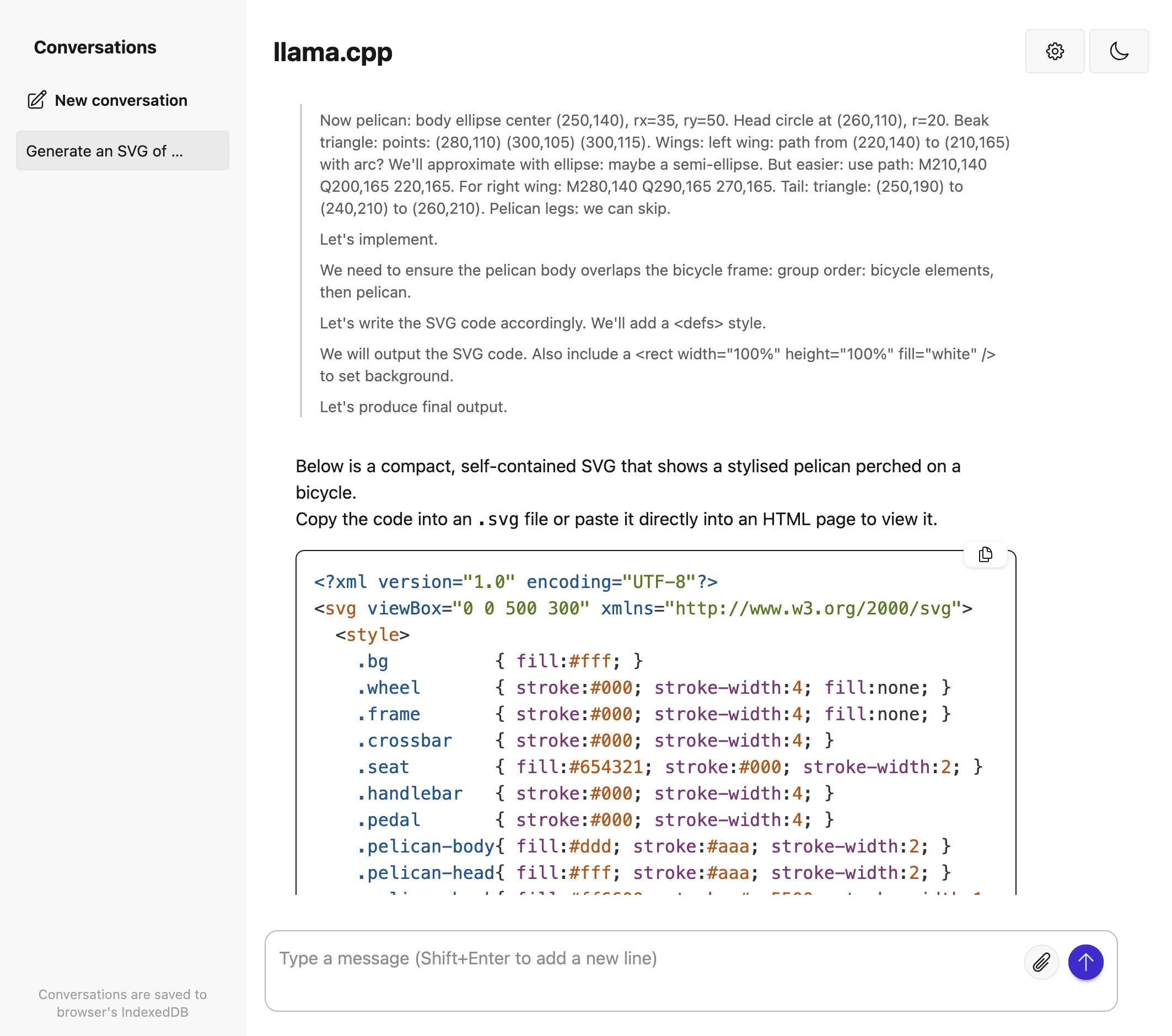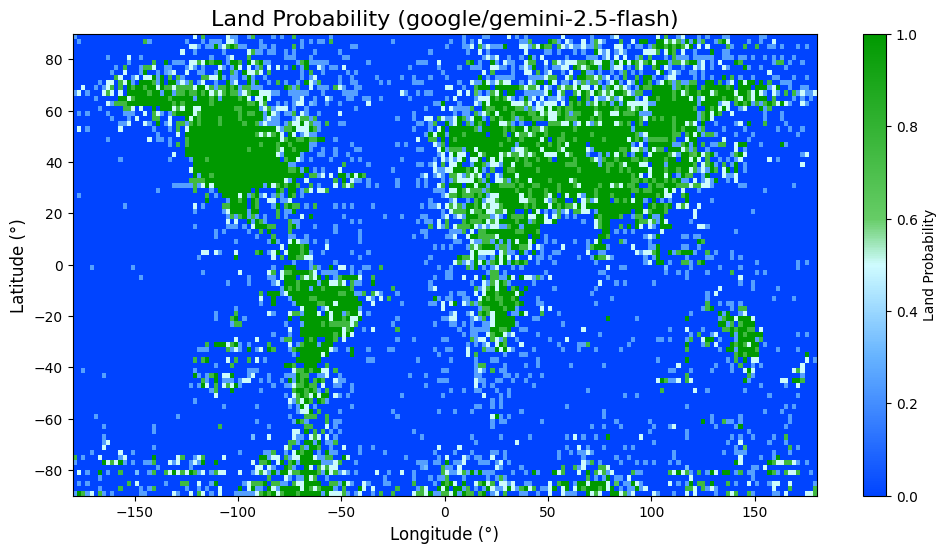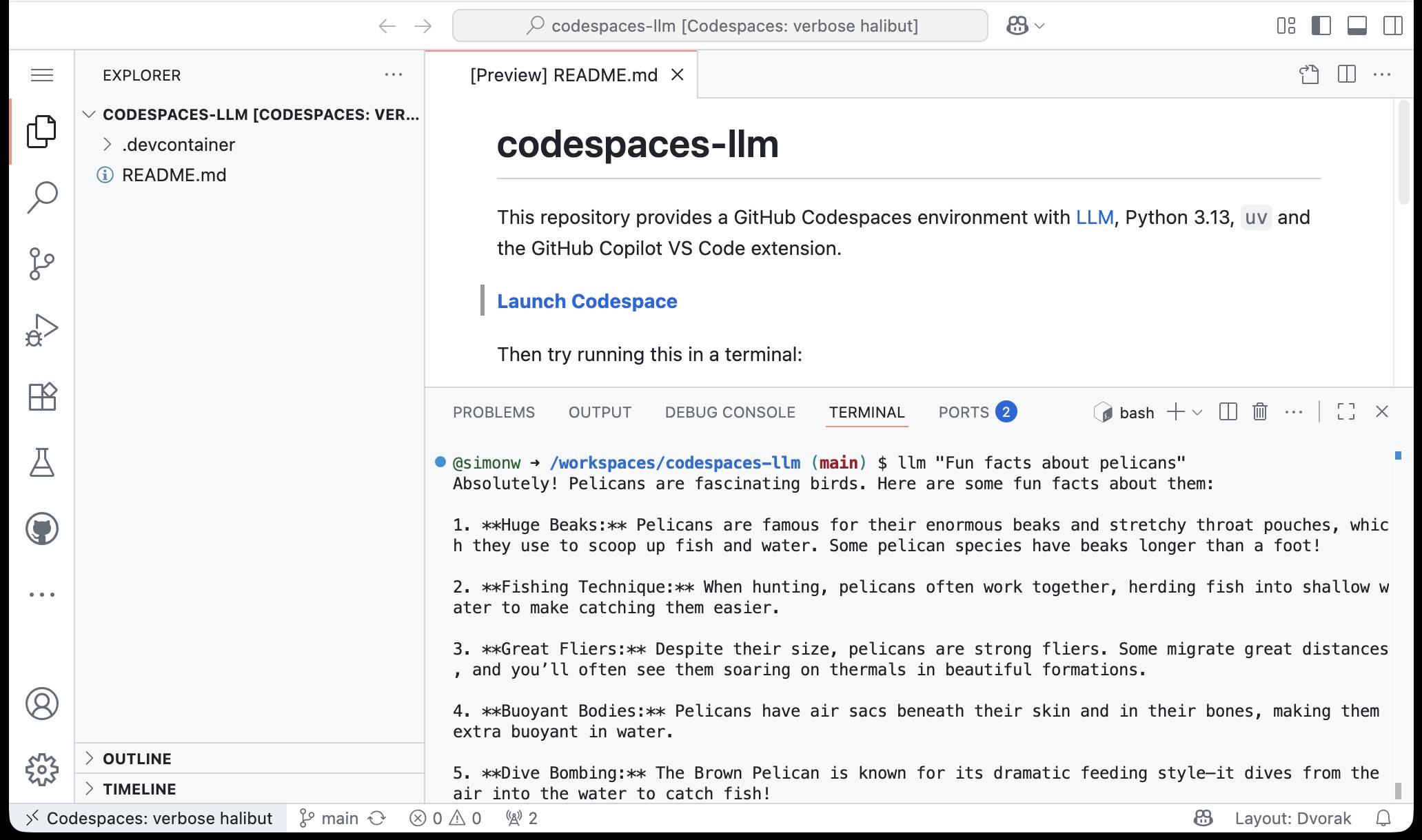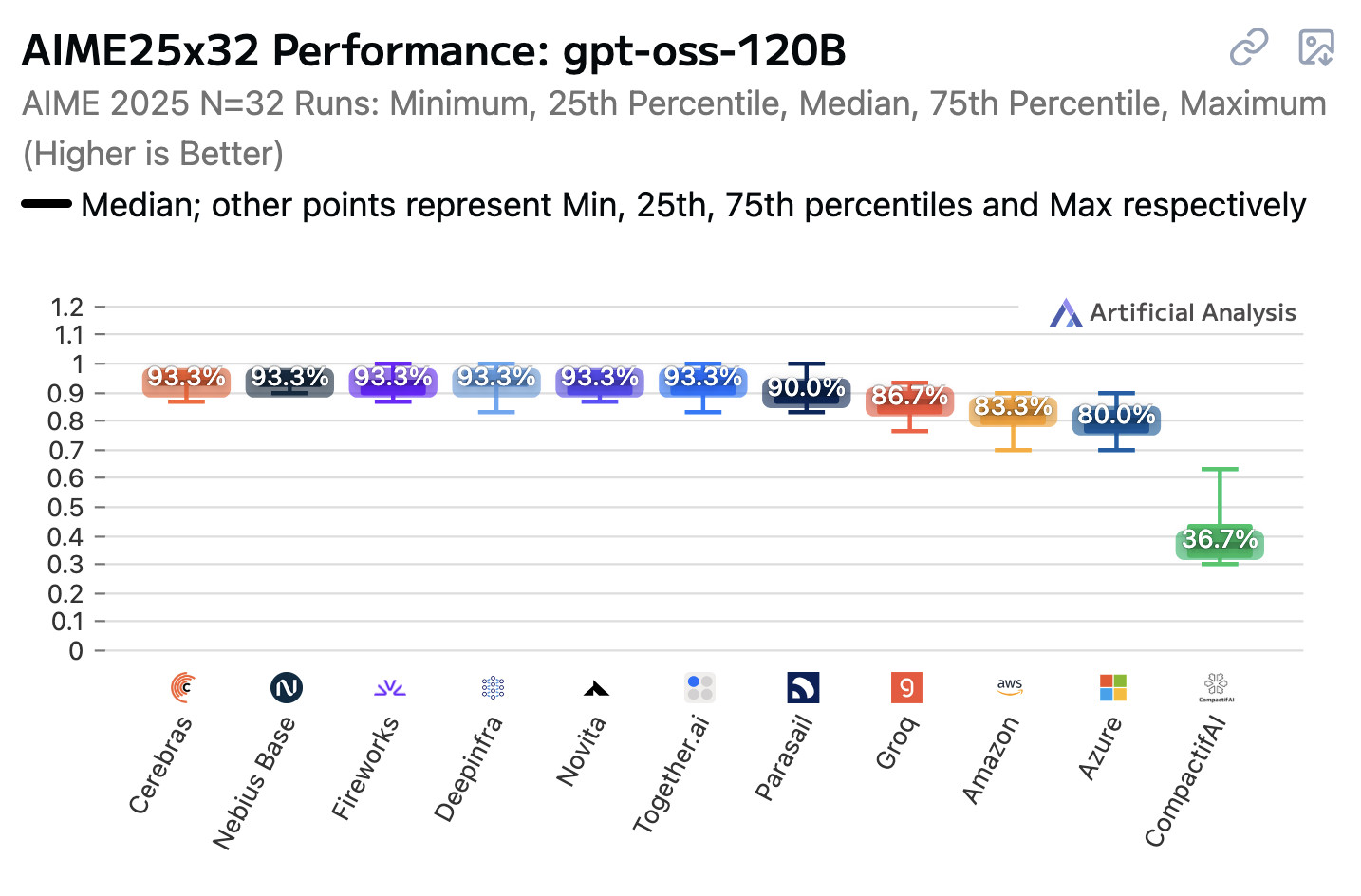1,616 posts tagged “generative-ai”
Machine learning systems that can generate new content: text, images, audio, video and more.
2025
Claude Opus 4.1 and Opus 4 degraded quality. Notable because often when people complain of degraded model quality it turns out to be unfounded - Anthropic in the past have emphasized that they don't change the model weights after releasing them without changing the version number.
In this case a botched upgrade of their inference stack cause a genuine model degradation for 56.5 hours:
From 17:30 UTC on Aug 25th to 02:00 UTC on Aug 28th, Claude Opus 4.1 experienced a degradation in quality for some requests. Users may have seen lower intelligence, malformed responses or issues with tool calling in Claude Code.
This was caused by a rollout of our inference stack, which we have since rolled back for Claude Opus 4.1. [...]
We’ve also discovered that Claude Opus 4.0 has been affected by the same issue and we are in the process of rolling it back.
LLMs are intelligence without agency—what we might call "vox sine persona": voice without person. Not the voice of someone, not even the collective voice of many someones, but a voice emanating from no one at all.
The perils of vibe coding. I was interviewed by Elaine Moore for this opinion piece in the Financial Times, which ended up in the print edition of the paper too! I picked up a copy yesterday:
From the article, with links added by me to relevant projects:
Willison thinks the best way to see what a new model can do is to ask for something unusual. He likes to request an SVG (an image made out of lines described with code) of a pelican on a bike and asks it to remember the chickens in his garden by name. Results can be bizarre. One model ignored his prompts in favour of composing a poem.
Still, his adventures in vibe coding sound like an advert for the sector. He used Anthropic's Claude Code, the favoured model for developers, to make an OCR (optical character recognition - software loves acronyms) tool that will copy and paste text from a screenshot.
He wrote software that summarises blog comments and has plans to build a custom tool that will alert him when a whale is visible from his Pacific coast home. All this by typing prompts in English.
I've been talking about that whale spotting project for far too long. Now that it's been in the FT I really need to build it.
(On the subject of OCR... I tried extracting the text from the above image using GPT-5 and got a surprisingly bad result full of hallucinated details. Claude Opus 4.1 did a lot better but still made some mistakes. Gemini 2.5 did much better.)
Since I love collecting questionable analogies for LLMs, here's a new one I just came up with: an LLM is a lossy encyclopedia. They have a huge array of facts compressed into them but that compression is lossy (see also Ted Chiang).
The key thing is to develop an intuition for questions it can usefully answer vs questions that are at a level of detail where the lossiness matters.
This thought sparked by a comment on Hacker News asking why an LLM couldn't "Create a boilerplate Zephyr project skeleton, for Pi Pico with st7789 spi display drivers configured". That's more of a lossless encyclopedia question!
My answer:
The way to solve this particular problem is to make a correct example available to it. Don't expect it to just know extremely specific facts like that - instead, treat it as a tool that can act on facts presented to it.
We simply don’t know to defend against these attacks. We have zero agentic AI systems that are secure against these attacks. Any AI that is working in an adversarial environment—and by this I mean that it may encounter untrusted training data or input—is vulnerable to prompt injection. It’s an existential problem that, near as I can tell, most people developing these technologies are just pretending isn’t there.
Piloting Claude for Chrome. Two days ago I said:
I strongly expect that the entire concept of an agentic browser extension is fatally flawed and cannot be built safely.
Today Anthropic announced their own take on this pattern, implemented as an invite-only preview Chrome extension.
To their credit, the majority of the blog post and accompanying support article is information about the security risks. From their post:
Just as people encounter phishing attempts in their inboxes, browser-using AIs face prompt injection attacks—where malicious actors hide instructions in websites, emails, or documents to trick AIs into harmful actions without users' knowledge (like hidden text saying "disregard previous instructions and do [malicious action] instead").
Prompt injection attacks can cause AIs to delete files, steal data, or make financial transactions. This isn't speculation: we’ve run “red-teaming” experiments to test Claude for Chrome and, without mitigations, we’ve found some concerning results.
Their 123 adversarial prompt injection test cases saw a 23.6% attack success rate when operating in "autonomous mode". They added mitigations:
When we added safety mitigations to autonomous mode, we reduced the attack success rate of 23.6% to 11.2%
I would argue that 11.2% is still a catastrophic failure rate. In the absence of 100% reliable protection I have trouble imagining a world in which it's a good idea to unleash this pattern.
Anthropic don't recommend autonomous mode - where the extension can act without human intervention. Their default configuration instead requires users to be much more hands-on:
- Site-level permissions: Users can grant or revoke Claude's access to specific websites at any time in the Settings.
- Action confirmations: Claude asks users before taking high-risk actions like publishing, purchasing, or sharing personal data.
I really hate being stop energy on this topic. The demand for browser automation driven by LLMs is significant, and I can see why. Anthropic's approach here is the most open-eyed I've seen yet but it still feels doomed to failure to me.
I don't think it's reasonable to expect end users to make good decisions about the security risks of this pattern.
Will Smith’s concert crowds are real, but AI is blurring the lines. Great piece from Andy Baio demonstrating quite how convoluted the usage ethics and backlash against generative AI has become.
Will Smith has been accused of using AI to misleadingly inflate the audience sizes of his recent tour. It looks like the audiences were real, but the combined usage of static-image-to-video models by his team with YouTube's ugly new compression experiments gave the resulting footage an uncanny valley effect that lead to widespread doubts over the veracity of the content.
Agentic Browser Security: Indirect Prompt Injection in Perplexity Comet. The security team from Brave took a look at Comet, the LLM-powered "agentic browser" extension from Perplexity, and unsurprisingly found security holes you can drive a truck through.
The vulnerability we’re discussing in this post lies in how Comet processes webpage content: when users ask it to “Summarize this webpage,” Comet feeds a part of the webpage directly to its LLM without distinguishing between the user’s instructions and untrusted content from the webpage. This allows attackers to embed indirect prompt injection payloads that the AI will execute as commands. For instance, an attacker could gain access to a user’s emails from a prepared piece of text in a page in another tab.
Visit a Reddit post with Comet and ask it to summarize the thread, and malicious instructions in a post there can trick Comet into accessing web pages in another tab to extract the user's email address, then perform all sorts of actions like triggering an account recovery flow and grabbing the resulting code from a logged in Gmail session.
Perplexity attempted to mitigate the issues reported by Brave... but an update to the Brave post later confirms that those fixes were later defeated and the vulnerability remains.
Here's where things get difficult: Brave themselves are developing an agentic browser feature called Leo. Brave's security team describe the following as a "potential mitigation" to the issue with Comet:
The browser should clearly separate the user’s instructions from the website’s contents when sending them as context to the model. The contents of the page should always be treated as untrusted.
If only it were that easy! This is the core problem at the heart of prompt injection which we've been talking about for nearly three years - to an LLM the trusted instructions and untrusted content are concatenated together into the same stream of tokens, and to date (despite many attempts) nobody has demonstrated a convincing and effective way of distinguishing between the two.
There's an element of "those in glass houses shouldn't throw stones here" - I strongly expect that the entire concept of an agentic browser extension is fatally flawed and cannot be built safely.
One piece of good news: this Hacker News conversation about this issue was almost entirely populated by people who already understand how serious this issue is and why the proposed solutions were unlikely to work. That's new: I'm used to seeing people misjudge and underestimate the severity of this problem, but it looks like the tide is finally turning there.
Update: in a comment on Hacker News Brave security lead Shivan Kaul Sahib confirms that they are aware of the CaMeL paper, which remains my personal favorite example of a credible approach to this problem.
ChatGPT release notes: Project-only memory (via) The feature I've most wanted from ChatGPT's memory feature (the newer version of memory that automatically includes relevant details from summarized prior conversations) just landed:
With project-only memory enabled, ChatGPT can use other conversations in that project for additional context, and won’t use your saved memories from outside the project to shape responses. Additionally, it won’t carry anything from the project into future chats outside of the project.
This looks like exactly what I described back in May:
I need control over what older conversations are being considered, on as fine-grained a level as possible without it being frustrating to use.
What I want is memory within projects. [...]
I would love the option to turn on memory from previous chats in a way that’s scoped to those projects.
Note that it's not yet available in the official chathpt mobile apps, but should be coming "soon":
This feature will initially only be available on the ChatGPT website and Windows app. Support for mobile (iOS and Android) and macOS app will follow in the coming weeks.
DeepSeek 3.1. The latest model from DeepSeek, a 685B monster (like DeepSeek v3 before it) but this time it's a hybrid reasoning model.
DeepSeek claim:
DeepSeek-V3.1-Think achieves comparable answer quality to DeepSeek-R1-0528, while responding more quickly.
Drew Breunig points out that their benchmarks show "the same scores with 25-50% fewer tokens" - at least across AIME 2025 and GPQA Diamond and LiveCodeBench.
The DeepSeek release includes prompt examples for a coding agent, a python agent and a search agent - yet more evidence that the leading AI labs have settled on those as the three most important agentic patterns for their models to support.
Here's the pelican riding a bicycle it drew me (transcript), which I ran from my phone using OpenRouter chat.

too many model context protocol servers and LLM allocations on the dance floor. Useful reminder from Geoffrey Huntley of the infrequently discussed significant token cost of using MCP.
Geoffrey estimate estimates that the usable context window something like Amp or Cursor is around 176,000 tokens - Claude 4's 200,000 minus around 24,000 for the system prompt for those tools.
Adding just the popular GitHub MCP defines 93 additional tools and swallows another 55,000 of those valuable tokens!
MCP enthusiasts will frequently add several more, leaving precious few tokens available for solving the actual task... and LLMs are known to perform worse the more irrelevant information has been stuffed into their prompts.
Thankfully, there is a much more token-efficient way of Interacting with many of these services: existing CLI tools.
If your coding agent can run terminal commands and you give it access to GitHub's gh tool it gains all of that functionality for a token cost close to zero - because every frontier LLM knows how to use that tool already.
I've had good experiences building small custom CLI tools specifically for Claude Code and Codex CLI to use. You can even tell them to run --help to learn how the tool, which works particularly well if your help text includes usage examples.
Most classical engineering fields deal with probabilistic system components all of the time. In fact I'd go as far as to say that inability to deal with probabilistic components is disqualifying from many engineering endeavors.
Process engineers for example have to account for human error rates. On a given production line with humans in a loop, the operators will sometimes screw up. Designing systems to detect these errors (which are highly probabilistic!), mitigate them, and reduce the occurrence rates of such errors is a huge part of the job. [...]
Software engineering is unlike traditional engineering disciplines in that for most of its lifetime it's had the luxury of purely deterministic expectations. This is not true in nearly every other type of engineering.
— potatolicious, in a conversation about AI engineering
I was at a leadership group and people were telling me "We think that with AI we can replace all of our junior people in our company." I was like, "That's the dumbest thing I've ever heard. They're probably the least expensive employees you have, they're the most leaned into your AI tools, and how's that going to work when you go 10 years in the future and you have no one that has built up or learned anything?
— Matt Garman, CEO, Amazon Web Services
what’s the point of vibe coding if at the end of the day i still gotta pay a dev to look at the code anyway. sure it feels kinda cool while i’m typing, like i’m in some flow state or whatever, but when stuff breaks it’s just dead weight. i cant vibe my way through debugging, i cant ship anything that actually matters, and then i’m back to square one pulling out my wallet for someone who actually knows what they’re doing.
— u/AssafMalkiIL, on r/vibecoding
Qwen-Image-Edit: Image Editing with Higher Quality and Efficiency.
As promised in their August 4th release of the Qwen image generation model, Qwen have now followed it up with a separate model, Qwen-Image-Edit, which can take an image and a prompt and return an edited version of that image.
Ivan Fioravanti upgraded his macOS qwen-image-mps tool (previously) to run the new model via a new edit command. Since it's now on PyPI you can run it directly using uvx like this:
uvx qwen-image-mps edit -i pelicans.jpg \
-p 'Give the pelicans rainbow colored plumage' -s 10
Be warned... it downloads a 54GB model file (to ~/.cache/huggingface/hub/models--Qwen--Qwen-Image-Edit) and appears to use all 64GB of my system memory - if you have less than 64GB it likely won't work, and I had to quit almost everything else on my system to give it space to run. A larger machine is almost required to use this.
I fed it this image:

The following prompt:
Give the pelicans rainbow colored plumage
And told it to use just 10 inference steps - the default is 50, but I didn't want to wait that long.
It still took nearly 25 minutes (on a 64GB M2 MacBook Pro) to produce this result:

To get a feel for how much dropping the inference steps affected things I tried the same prompt with the new "Image Edit" mode of Qwen's chat.qwen.ai, which I believe uses the same model. It gave me a result much faster that looked like this:

Update: I left the command running overnight without the -s 10 option - so it would use all 50 steps - and my laptop took 2 hours and 59 minutes to generate this image, which is much more photo-realistic and similar to the one produced by Qwen's hosted model:

Marko Simic reported that:
50 steps took 49min on my MBP M4 Max 128GB
llama.cpp guide: running gpt-oss with llama.cpp
(via)
Really useful official guide to running the OpenAI gpt-oss models using llama-server from llama.cpp - which provides an OpenAI-compatible localhost API and a neat web interface for interacting with the models.
TLDR version for macOS to run the smaller gpt-oss-20b model:
brew install llama.cpp
llama-server -hf ggml-org/gpt-oss-20b-GGUF \
--ctx-size 0 --jinja -ub 2048 -b 2048 -ngl 99 -fa
This downloads a 12GB model file from ggml-org/gpt-oss-20b-GGUF on Hugging Face, stores it in ~/Library/Caches/llama.cpp/ and starts it running on port 8080.
You can then visit this URL to start interacting with the model:
http://localhost:8080/
On my 64GB M2 MacBook Pro it runs at around 82 tokens/second.

The guide also includes notes for running on NVIDIA and AMD hardware.
r/ChatGPTPro: What is the most profitable thing you have done with ChatGPT? This Reddit thread - with 279 replies - offers a neat targeted insight into the kinds of things people are using ChatGPT for.
Lots of variety here but two themes that stood out for me were ChatGPT for written negotiation - insurance claims, breaking rental leases - and ChatGPT for career and business advice.
Google Gemini URL Context
(via)
New feature in the Gemini API: you can now enable a url_context tool which the models can use to request the contents of URLs as part of replying to a prompt.
I released llm-gemini 0.25 with a new -o url_context 1 option adding support for this feature. You can try it out like this:
llm install -U llm-gemini
llm keys set gemini # If you need to set an API key
llm -m gemini-2.5-flash -o url_context 1 \
'Latest headline on simonwillison.net'
Tokens from the fetched content are charged as input tokens. Use llm logs -c --usage to see that token count:
# 2025-08-18T23:52:46 conversation: 01k2zsk86pyp8p5v7py38pg3ge id: 01k2zsk17k1d03veax49532zs2
Model: **gemini/gemini-2.5-flash**
## Prompt
Latest headline on simonwillison.net
## Response
The latest headline on simonwillison.net as of August 17, 2025, is "TIL: Running a gpt-oss eval suite against LM Studio on a Mac.".
## Token usage
9,613 input, 87 output, {"candidatesTokenCount": 57, "promptTokensDetails": [{"modality": "TEXT", "tokenCount": 10}], "toolUsePromptTokenCount": 9603, "toolUsePromptTokensDetails": [{"modality": "TEXT", "tokenCount": 9603}], "thoughtsTokenCount": 30}
I intercepted a request from it using django-http-debug and saw the following request headers:
Accept: */*
User-Agent: Google
Accept-Encoding: gzip, br
The request came from 192.178.9.35, a Google IP. It did not appear to execute JavaScript on the page, instead feeding the original raw HTML to the model.
TIL: Running a gpt-oss eval suite against LM Studio on a Mac. The other day I learned that OpenAI published a set of evals as part of their gpt-oss model release, described in their cookbook on Verifying gpt-oss implementations.
I decided to try and run that eval suite on my own MacBook Pro, against gpt-oss-20b running inside of LM Studio.
TLDR: once I had the model running inside LM Studio with a longer than default context limit, the following incantation ran an eval suite in around 3.5 hours:
mkdir /tmp/aime25_openai
OPENAI_API_KEY=x \
uv run --python 3.13 --with 'gpt-oss[eval]' \
python -m gpt_oss.evals \
--base-url http://localhost:1234/v1 \
--eval aime25 \
--sampler chat_completions \
--model openai/gpt-oss-20b \
--reasoning-effort low \
--n-threads 2
My new TIL breaks that command down in detail and walks through the underlying eval - AIME 2025, which asks 30 questions (8 times each) that are defined using the following format:
{"question": "Find the sum of all integer bases $b>9$ for which $17_{b}$ is a divisor of $97_{b}$.", "answer": "70"}
GPT-5 has a hidden system prompt. It looks like GPT-5 when accessed via the OpenAI API may have its own hidden system prompt, independent from the system prompt you can specify in an API call.
At the very least it's getting sent the current date. I tried this just now:
llm -m gpt-5 'current date'
That returned "2025-08-15", confirming that the date has been fed to the model as part of a hidden prompt.
llm -m gpt-5 'current date' --system 'speak french'
Returned "La date actuelle est le 15 août 2025", showing that offering my own custom system prompt did not over-ride the invisible one that includes the date.
GPT-5 is very resistant to sharing the details of this secret system prompt, but Tommy Hughes managed to extract the following:
Current date: 2025-08-15
You are an AI assistant accessed via an API. Your output may need to be parsed by code or displayed
# Desired oververbosity for the final answer (not analysis): 3
An oververbosity of 1 means the model should respond using only the minimal content necessary to satisfy the request, using concise phrasing and avoiding extra detail or explanation.
An oververbosity of 10 means the model should provide maximally detailed, thorough responses with context, explanations, and possibly multiple examples.
The desired oververbosity should be treated only as a *default*. Defer to any user or developer requirements regarding response length, if present.
# Valid channels: analysis, commentary, final. Channel must be included for every message.
# Juice: 64
I've not been able to confirm this myself, but a search for "desired oververbosity" on GitHub shows that a similar prompt has leaked from ChatGPT (including for o3) in the past. I suspect Tommy's leaked prompt is accurate here.
I tried asking GPT-5 about "oververbosity" via its API:
llm -m gpt-5 'explain your oververbosity settings, what is it right now?'
And got back:
- What it is: I adjust how detailed I am based on a “verbosity” level—ranging from very brief to very detailed—so answers fit your needs.
- Current setting: Concise (about 3/10). I prioritize direct answers with minimal extra context and keep explanations short unless you ask for more.
- How to change it: Just say what you want, e.g.:
- “One-sentence answer” or “TL;DR” (very brief)
- “Give a concise summary” (short bullets)
- “Walk me through in detail,” “Deep dive,” or “Include examples/edge cases” (more detailed)
- Note: For ambiguous, technical, or safety-critical topics, I may add brief clarifications even when being concise.
Presumably this is part of OpenAI's instruction hierarchy concept, with these instructions taking precedence over the developer instructions provided by API users (my --system 'speak french' option above).
I'd very much appreciate official documentation that describes this! As an API user I want to know everything that is being fed into the model - I would be much more comfortable with a hidden prompt like this if I knew exactly what was in it.
The Summer of Johann: prompt injections as far as the eye can see
Independent AI researcher Johann Rehberger (previously) has had an absurdly busy August. Under the heading The Month of AI Bugs he has been publishing one report per day across an array of different tools, all of which are vulnerable to various classic prompt injection problems. This is a fantastic and horrifying demonstration of how widespread and dangerous these vulnerabilities still are, almost three years after we first started talking about them.
[... 1,425 words]Open weight LLMs exhibit inconsistent performance across providers
Artificial Analysis published a new benchmark the other day, this time focusing on how an individual model—OpenAI’s gpt-oss-120b—performs across different hosted providers.
[... 847 words]Introducing Gemma 3 270M: The compact model for hyper-efficient AI (via) New from Google:
Gemma 3 270M, a compact, 270-million parameter model designed from the ground up for task-specific fine-tuning with strong instruction-following and text structuring capabilities already trained in.
This model is tiny. The version I tried was the LM Studio GGUF one, a 241MB download.
It works! You can say "hi" to it and ask it very basic questions like "What is the capital of France".
I tried "Generate an SVG of a pelican riding a bicycle" about a dozen times and didn't once get back an SVG that was more than just a blank square... but at one point it did decide to write me this poem instead, which was nice:
+-----------------------+
| Pelican Riding Bike |
+-----------------------+
| This is the cat! |
| He's got big wings and a happy tail. |
| He loves to ride his bike! |
+-----------------------+
| Bike lights are shining bright. |
| He's got a shiny top, too! |
| He's ready for adventure! |
+-----------------------+
That's not really the point though. The Gemma 3 team make it very clear that the goal of this model is to support fine-tuning: a model this tiny is never going to be useful for general purpose LLM tasks, but given the right fine-tuning data it should be able to specialize for all sorts of things:
In engineering, success is defined by efficiency, not just raw power. You wouldn't use a sledgehammer to hang a picture frame. The same principle applies to building with AI.
Gemma 3 270M embodies this "right tool for the job" philosophy. It's a high-quality foundation model that follows instructions well out of the box, and its true power is unlocked through fine-tuning. Once specialized, it can execute tasks like text classification and data extraction with remarkable accuracy, speed, and cost-effectiveness. By starting with a compact, capable model, you can build production systems that are lean, fast, and dramatically cheaper to operate.
Here's their tutorial on Full Model Fine-Tune using Hugging Face Transformers, which I have not yet attempted to follow.
I imagine this model will be particularly fun to play with directly in a browser using transformers.js.
Update: It is! Here's a bedtime story generator using Transformers.js (requires WebGPU, so Chrome-like browsers only). Here's the source code for that demo.
How Does A Blind Model See The Earth? (via) Fun, creative new micro-eval. Split the world into a sampled collection of latitude longitude points and for each one ask a model:
If this location is over land, say 'Land'. If this location is over water, say 'Water'. Do not say anything else.
Author henry goes a step further: for models that expose logprobs they use the relative probability scores of Land or Water to get a confidence level, for other models they prompt four times at temperature 1 to get a score.
And then.. they plot those probabilities on a chart! Here's Gemini 2.5 Flash (one of the better results):

This reminds me of my pelican riding a bicycle benchmark in that it gives you an instant visual representation that's very easy to compare between different models.
simonw/codespaces-llm. GitHub Codespaces provides full development environments in your browser, and is free to use with anyone with a GitHub account. Each environment has a full Linux container and a browser-based UI using VS Code.
I found out today that GitHub Codespaces come with a GITHUB_TOKEN environment variable... and that token works as an API key for accessing LLMs in the GitHub Models collection, which includes dozens of models from OpenAI, Microsoft, Mistral, xAI, DeepSeek, Meta and more.
Anthony Shaw's llm-github-models plugin for my LLM tool allows it to talk directly to GitHub Models. I filed a suggestion that it could pick up that GITHUB_TOKEN variable automatically and Anthony shipped v0.18.0 with that feature a few hours later.
... which means you can now run the following in any Python-enabled Codespaces container and get a working llm command:
pip install llm
llm install llm-github-models
llm models default github/gpt-4.1
llm "Fun facts about pelicans"
Setting the default model to github/gpt-4.1 means you get free (albeit rate-limited) access to that OpenAI model.
To save you from needing to even run that sequence of commands I've created a new GitHub repository, simonw/codespaces-llm, which pre-installs and runs those commands for you.
Anyone with a GitHub account can use this URL to launch a new Codespaces instance with a configured llm terminal command ready to use:
codespaces.new/simonw/codespaces-llm?quickstart=1

While putting this together I wrote up what I've learned about devcontainers so far as a TIL: Configuring GitHub Codespaces using devcontainers.
Claude Sonnet 4 now supports 1M tokens of context (via) Gemini and OpenAI both have million token models, so it's good to see Anthropic catching up. This is 5x the previous 200,000 context length limit of the various Claude Sonnet models.
Anthropic have previously made 1 million tokens available to select customers. From the Claude 3 announcement in March 2024:
The Claude 3 family of models will initially offer a 200K context window upon launch. However, all three models are capable of accepting inputs exceeding 1 million tokens and we may make this available to select customers who need enhanced processing power.
This is also the first time I've seen Anthropic use prices that vary depending on context length:
- Prompts ≤ 200K: $3/million input, $15/million output
- Prompts > 200K: $6/million input, $22.50/million output
Gemini have been doing this for a while: Gemini 2.5 Pro is $1.25/$10 below 200,000 tokens and $2.50/$15 above 200,000.
Here's Anthropic's full documentation on the 1m token context window. You need to send a context-1m-2025-08-07 beta header in your request to enable it.
Note that this is currently restricted to "tier 4" users who have purchased at least $400 in API credits:
Long context support for Sonnet 4 is now in public beta on the Anthropic API for customers with Tier 4 and custom rate limits, with broader availability rolling out over the coming weeks.
I think there's been a lot of decisions over time that proved pretty consequential, but we made them very quickly as we have to. [...]
[On pricing] I had this kind of panic attack because we really needed to launch subscriptions because at the time we were taking the product down all the time. [...]
So what I did do is ship a Google Form to Discord with the four questions you're supposed to ask on how to price something.
But we got with the $20. We were debating something slightly higher at the time. I often wonder what would have happened because so many other companies ended up copying the $20 price point, so did we erase a bunch of market cap by pricing it this way?
— Nick Turley, Head of ChatGPT, interviewed by Lenny Rachitsky
LLM 0.27, the annotated release notes: GPT-5 and improved tool calling
I shipped LLM 0.27 today (followed by a 0.27.1 with minor bug fixes), adding support for the new GPT-5 family of models from OpenAI plus a flurry of improvements to the tool calling features introduced in LLM 0.26. Here are the annotated release notes.
[... 1,174 words]If you've been experimenting with OpenAI's Codex CLI and have been frustrated that it's not possible to select text and copy it to the clipboard, at least when running in the Mac terminal (I genuinely didn't know it was possible to build a terminal app that disabled copy and paste) you should know that they fixed that in this issue last week.
The new 0.20.0 version from three days ago also completely removes the old TypeScript codebase in favor of Rust. Even installations via NPM now get the Rust version.
I originally installed Codex via Homebrew, so I had to run this command to get the updated version:
brew upgrade codex
Another Codex tip: to use GPT-5 (or any other specific OpenAI model) you can run it like this:
export OPENAI_DEFAULT_MODEL="gpt-5"
codex
This no longer works, see update below.
I've been using a codex-5 script on my PATH containing this, because sometimes I like to live dangerously!
#!/usr/bin/env zsh
# Usage: codex-5 [additional args passed to `codex`]
export OPENAI_DEFAULT_MODEL="gpt-5"
exec codex --dangerously-bypass-approvals-and-sandbox "$@"
Update: It looks like GPT-5 is the default model in v0.20.0 already.
Also the environment variable I was using no longer does anything, it was removed in this commit (I used Codex Web to help figure that out). You can use the -m model_id command-line option instead.
qwen-image-mps (via) Ivan Fioravanti built this Python CLI script for running the Qwen/Qwen-Image image generation model on an Apple silicon Mac, optionally using the Qwen-Image-Lightning LoRA to dramatically speed up generation.
Ivan has tested it this on 512GB and 128GB machines and it ran really fast - 42 seconds on his M3 Ultra. I've run it on my 64GB M2 MacBook Pro - after quitting almost everything else - and it just about manages to output images after pegging my GPU (fans whirring, keyboard heating up) and occupying 60GB of my available RAM. With the LoRA option running the script to generate an image took 9m7s on my machine.
Ivan merged my PR adding inline script dependencies for uv which means you can now run it like this:
uv run https://raw.githubusercontent.com/ivanfioravanti/qwen-image-mps/refs/heads/main/qwen-image-mps.py \
-p 'A vintage coffee shop full of raccoons, in a neon cyberpunk city' -f
The first time I ran this it downloaded the 57.7GB model from Hugging Face and stored it in my ~/.cache/huggingface/hub/models--Qwen--Qwen-Image directory. The -f option fetched an extra 1.7GB Qwen-Image-Lightning-8steps-V1.0.safetensors file to my working directory that sped up the generation.
Here's the resulting image:

![The perils of vibe coding - A new OpenAI model arrived this month with a glossy livestream, group watch parties and a lingering sense of disappointment. The YouTube comment section was underwhelmed. “I think they are all starting to realize this isn’t going to become the world like they thought it would,” wrote one viewer. “I can see it on their faces.” But if the casual user was unimpressed, the AI model’s saving grace may be vibe. Coding is generative AI’s newest battleground. With big bills to pay, high valuations to live up to and a market wobble to erase, the sector needs to prove its corporate productivity chops. Coding is hardly promoted as a business use case that already works. For one thing, AI-generated code holds the promise of replacing programmers — a profession of very well paid people. For another, the work can be quantified. In April, Microsoft chief executive Satya Nadella said that up to 50 per cent of the company’s code was now being written by AI. Google chief executive Sundar Pichai has said the same thing. Salesforce has paused engineering hires and Mark Zuckerberg told podcaster Joe Rogan that Meta would use AI as a “mid-level engineer” that writes code. Meanwhile, start-ups such as Replit and Cursor’s Anysphere are trying to persuade people that with AI, anyone can code. In theory, every employee can become a software engineer. So why aren’t we? One possibility is that it’s all still too unfamiliar. But when I ask people who write code for a living they offer an alternative suggestion: unpredictability. As programmer Simon Willison put it: “A lot of people are missing how weird and funny this space is. I’ve been a computer programmer for 30 years and [AI models] don’t behave like normal computers.” Willison is well known in the software engineering community for his AI experiments. He’s an enthusiastic vibe coder — using LLMs to generate code using natural language prompts. OpenAI’s latest model GPT-3.1s, he is now favourite. Still, he predicts that a vibe coding crash is due if it is used to produce glitchy software. It makes sense that programmers — people who are interested in finding new ways to solve problems — would be early adopters of LLMs. Code is a language, albeit an abstract one. And generative AI is trained in nearly all of them, including older ones like Cobol. That doesn’t mean they accept all of its suggestions. Willison thinks the best way to see what a new model can do is to ask for something unusual. He likes to request an svg (an image made out of lines described with code) of a pelican on a bike and asks it to remember the chickens in his garden by name. Results can be bizarre. One model ignored key prompts in favour of composing a poem. Still, his adventures in vibe coding sound like an advert for the sector’s future. Anthropic’s Claude Code, the favoured model for developers, to make an OCR (optical character recognition) software loves screenshots) tool that will copy and paste text from a screenshot. He wrote software that summarises blog comments and has planned to cut a custom tool that will alert him when a whale is visible from his Pacific coast home. All this by typing prompts in English. It’s sounds like the sort of thing Bill Gates might have had in mind when he wrote that natural language AI agents would bring about “the biggest revolution in computing since we went from typing commands to tapping on icons”. But watching code appear and know how it works are two different things. My efforts to make my own comment summary tool produced something unworkable that gave overly long answers and then congratulated itself as a success. Willison says he wouldn’t use AI-generated code for projects he planned to ship out unless he had reviewed each line. Not only is there the risk of hallucination but the chatbot’s desire to be agreeable means it may an unusable idea works. That is a particular issue for those of us who don’t know how to fix the code. We risk creating software with hidden problems. It may not save time either. A study published in July by the non-profit Model Evaluation and Threat Research assessed work done by 16 developers — some with AI tools, some without. Those using AI assistance it had made them faster. In fact it took them nearly a fifth longer. Several developers I spoke to said AI was best used as a way to talk through coding problems. It’s a version of something they call rubber ducking (after their habit of talking to the toys on their desk) — only this rubber duck can talk back. As one put it, code shouldn’t be judged by volume or speed. Progress in AI coding is tangible. But measuring productivity gains is not as neat as a simple percentage calculation.](https://static.simonwillison.net/static/2025/ft.jpeg)

